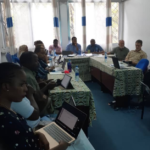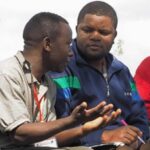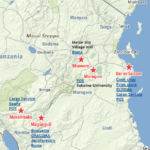farip supports innovation in rural areas and targeted attempts to improve the income of farming families in Tanzania with new business ideas. Small farmers are increasingly focusing their business ideas on fair trade and their own transport chain – without intermediaries – from the collection points in the highlands to the points of sale, and on direct marketing in the city. farip plays the role of both a microcredit bank and a coach and advisor to help these proactive people move forward. This gives them the chance to show in an experimental phase that their ideas can work. Rural startups emerge and become attractive investments.
DONATE NOW
 Smallholder farmers in Tanzania could produce much more, but they do not receive operating loans as banks demand land as collateral. However, losing the land to the bank in case of crop failure is not an option. Tanzanian farming families have now devised a new credit mechanism: Instead of offering the parcels, the farming families only offer the valuable trees on their parcels as collateral for loans.
Smallholder farmers in Tanzania could produce much more, but they do not receive operating loans as banks demand land as collateral. However, losing the land to the bank in case of crop failure is not an option. Tanzanian farming families have now devised a new credit mechanism: Instead of offering the parcels, the farming families only offer the valuable trees on their parcels as collateral for loans.
With the proceeds from donations, farip can grant loans to small-scale producer families for the production of beans and potatoes. Since January 2024, the second production cycle with loans secured by growing trees has already been underway. Donate now..
FORESTS RICH IN BIODIVERSITY
 Severina, Damian, and Ezekeli are discussing with farip in Bahat’s natural forest how they can benefit from a natural forest. Damian says, “We understand the value of the natural forest very well. But we also need to solve our ongoing financial struggles with it. How can we turn our own natural forests into real money? At the moment, we’re forced to produce charcoal from it.” The discussion centers on how they can generate a steady income from their forests, which are rich in biodiversity. Could international biodiversity payments be a possible solution?
Severina, Damian, and Ezekeli are discussing with farip in Bahat’s natural forest how they can benefit from a natural forest. Damian says, “We understand the value of the natural forest very well. But we also need to solve our ongoing financial struggles with it. How can we turn our own natural forests into real money? At the moment, we’re forced to produce charcoal from it.” The discussion centers on how they can generate a steady income from their forests, which are rich in biodiversity. Could international biodiversity payments be a possible solution?
THE FARIP DELEGATION IN TANZANIA
 Dar es Salaam, 2024-09-10. The first stop on the farip delegation’s journey through Tanzania is the Institute of Development Studies at the University of Dar es Salaam. During the kick-off meeting, the university outlines the topics it plans to research. Institute Director Colman Msoka states: “We absolutely need to develop our research questions on-site in Magunguli, during conversations with the local villagers.”
Dar es Salaam, 2024-09-10. The first stop on the farip delegation’s journey through Tanzania is the Institute of Development Studies at the University of Dar es Salaam. During the kick-off meeting, the university outlines the topics it plans to research. Institute Director Colman Msoka states: “We absolutely need to develop our research questions on-site in Magunguli, during conversations with the local villagers.”
Happy faces
 Yohana Simon (left) and Yegela Mikembo at the cattle market in Ludewa. Ludewa is a marketplace near Msowero, deep in the bush, at the edge of the savannah where the Maasai graze their livestock.
Yohana Simon (left) and Yegela Mikembo at the cattle market in Ludewa. Ludewa is a marketplace near Msowero, deep in the bush, at the edge of the savannah where the Maasai graze their livestock.
Together with farmers Josephine, Mensa and Minjigo, Yohana and Yegela bought calves six months ago with a GRACOMA loan. Now, after fattening them up, they’re able to sell the cows at a good price to the Maasai. This allows them to repay the loan, which they secured with trees on their plots. This is already the second credit cycle running as a groundbraking TCRD mechanism (tree secured credit for rural development) under farip’s supervision in Tanzania.
University Visits GRACOMA Field Laboratory
 Dar es Salaam, 2024-06-01. The innovative tree-secured credit mechanism in Tanzania is increasingly drawing interest, including from the Institute of Development Studies at the University of Dar es Salaam.
Dar es Salaam, 2024-06-01. The innovative tree-secured credit mechanism in Tanzania is increasingly drawing interest, including from the Institute of Development Studies at the University of Dar es Salaam.
Now, the institute’s director, Dr. Msoka, along with his assistant Dr. Mlinga, embarked on a week-long trip to Msowero and Magunguli in May. The trip aims to prepare for a research cycle, with a dozen students already enrolled at the Institute of Development Studies to explore topics such as biodiversity and tree-secured credits for rural development.
Read more about the university’s interest in rural development credits..
SCOUTUNG
 How does scouting work? What is the pathway from idea to experimentation? How can an interesting idea from rural Africa be transformed into a successful small business? It takes scouting! This is what farip specialises in: “scouting”. We pick up ideas brought to us by proactive people in rural Tanzania. farip then digs deeper and challenges these ideas, asking questions like: Who are the innovative potential entrepreneurs and their team members who want to bring this innovation to life? How do they organise themselves? Which technical tests can show whether the business idea is feasible? And where is the market for the products?
How does scouting work? What is the pathway from idea to experimentation? How can an interesting idea from rural Africa be transformed into a successful small business? It takes scouting! This is what farip specialises in: “scouting”. We pick up ideas brought to us by proactive people in rural Tanzania. farip then digs deeper and challenges these ideas, asking questions like: Who are the innovative potential entrepreneurs and their team members who want to bring this innovation to life? How do they organise themselves? Which technical tests can show whether the business idea is feasible? And where is the market for the products?
MAP
 farip’s ventures are concentrated in the southern highlands around Makambako and Magunguli, as well as along the cargo service’s route to Dar es-Salaam, in Msowero and Morogoro. farip also supports ventures in Dar es-Salaam.
farip’s ventures are concentrated in the southern highlands around Makambako and Magunguli, as well as along the cargo service’s route to Dar es-Salaam, in Msowero and Morogoro. farip also supports ventures in Dar es-Salaam.
Updated: 2024-10-07
